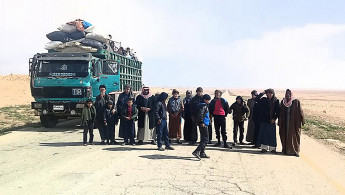EXCLUSIVE: Syrian refugees from Rukban camp fear execution in regime 'reception centres'
Former Rukban residents held in detention have told The New Arab that they were being pressured to "confess" to alleged crimes and were not being allowed to leave the "reception centres" until they did, despite a promise from the United Nations to ensure that they would be able to return to their towns and villages.
Many people held at the regime reception centres fear that their ultimate fate will be imprisonment in security centres or even execution, and there have been reports of refugees being beaten.
Read more: Syrians fled for a reason. Now their safe return is at stake.
Around 40,000 people used to live in the Rukban camp, which is located near the Syrian-Jordanian border. However, the camp came under a brutal siege by the Assad regime and its ally Russia in October 2018, who demanded that residents leave the camp for regime territory.
Russia and the regime stopped deliveries of aid to the camp, forcing people to survive on one small meal a day and causing the deaths of dozens of infants.
 |
Rukban camp came under a brutal siege by the Assad regime and its ally Russia in October 2018, who demanded that residents leave for regime territory |  |
However, residents of the camp had originally fled to the camp from regime-held territory and feared arrest, torture or execution if they returned. For months they refused to leave, but in the end most residents found they had no choice. Today, only a few thousand people remain in Rukban.
The reception centres were originally set up to temporarily house the refugees who left Rukban before they were to be transported to their towns and villages of origin. They were also to be given papers saying that their status was "regularised" and that they would not be subject to any prosecution.
'They won't tell us our fate'
However, Abu Mohamed Al-Homsi, a former resident of the camp being held in a reception centre, said, "I was interrogated several times. Every time I was accused of several charges – taking part in protests, stirring up riots, and dealing with armed opposition groups. Then they accused me of dealing with IS. I confessed to taking part in protests but I've never held a gun.
"They insisted that I confess and they hinted that my confession would make my exit from the reception centre easier but I know people who've confessed to everything they were accused of months ago, hoping to be able to leave, but they're still with us."
Twitter Post
|
Al-Homsi said that residents were now afraid of being handed over to the regime's security forces.
Another former Rukban resident, Omar Al-Shami, told The New Arab, "We don't understand why they're treating us like this. They won't tell us what our fate will be whether we confess or we don't. No one has an answer to how long we will stay in the centre."
Al-Shami, however, said that the regime permitted reception centre inmates to use mobile phones as they pleased and didn't ask to see them during interrogations.
This is how The New Arab was able to speak to the residents. Families and friends of the inmates were also permitted to visit them.
'A lot of fear'
In Rukban, media activist Omar Homsi said, "There's a lot of fear over the fate of hundreds of people detained in reception centres accused of various charges. The United Nations promised to follow up their cases and let them out of the reception centres as soon as possible but didn't keep their promises."
He added that the regime's detention of refugees who had left the camp had made the remaining few thousand residents of Rukban even more reluctant to leave.
"Two thousand people were supposed to leave the camp in a convoy a few weeks ago, but only two hundred left and most of them did so because they were ill," he said.
Homsi added that even people who were crippled were being pressured to confess to cooperating with IS in regime detention centres.
Some former camp residents, however, had ties to the Free Syrian Army and other opposition groups. "These people now fear being transferred to [regime] security branches and executed," Homsi said.
Homsi added that there were several recorded instances of people being beaten in the regime "reception centres", as well as cases of verbal abuse.
He also said that young men from the camp who had not done military service had been forcibly conscripted into the regime's army.
All names in this article have been changed.





 Follow the Middle East's top stories in English at The New Arab on Google News
Follow the Middle East's top stories in English at The New Arab on Google News


